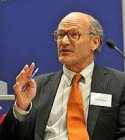Paul Ekins has a Ph.D. in economics from the University of London and is Professor of Energy and Environment Policy at the UCL Energy Institute, University College London. He is also a Senior Consultant to Cambridge Econometrics; and a Co-Director of the UK Energy Research Centre, in charge of its Energy Systems and Modelling theme; and he leads University College’s participation in the EPSRC SUPERGEN consortia on hydrogen and bioenergy. He is a member of Ofgem’s high-level Environmental Advisory Group, and Chairman of the Government-funded National Industrial Symbiosis Programme (NISP), the UK’s most successful programme to improve resource productivity. From 2002-2008 was a Member of the Royal Commission on Environmental Pollution. From 1997-2005 he was a specialist adviser to the Environmental Audit Committee of the House of Commons, from 2003-2007 was a Member of the Government’s Sustainable Energy Policy Advisory Board, and in 2007 was a Specialist Adviser to the Joint Parliamentary Committee on the Climate Change Bill. He has also been a consultant to the Government’s Sustainable Development Commission, and an adviser to the UK Government’s Advisory Committee on Business and the Environment and Round Table on Sustainable Development, and has been a frequent contributor to His Royal Highness the Prince of Wales’ annual course for senior executives on business and the environment at the University of Cambridge. In 1994 Paul Ekins received a Global 500 Award ‘for outstanding environmental achievement’ from the United Nations Environment Programme.
Paul Ekins’ academic work focuses on the conditions and policies for achieving an environmentally sustainable economy, and he is an authority on a number of areas of energy-environment-economy interaction and environmental policy, including: sustainable development assessment methodologies; scenarios, modelling and forecasting; resource productivity; sustainable energy use; the adjustment of national accounts to take account of environmental impacts; environmental economic instruments and ecological tax reform; sustainable consumption; and environment and trade. He has extensive experience consulting for business, government and international organisations. This experience has included over 50 projects and consultancies over the last ten years, and many advisory positions. He is the author of numerous books, papers and articles on environmental taxation and other sustainable development issues, including Economic Growth and Environmental Sustainability: the Prospects for Green Growth (Routledge, London, 2000). He is co-editor of the books Understanding the Costs of Environmental Regulation in Europe (Edward Elgar, Cheltenham, 2009), Trade, Globalization, and Sustainability Impact Assessment: A Critical Look at Methods and Outcomes (Earthscan, London, 2009), Carbon-Energy Taxation: Lessons from Europe (Oxford University Press, Oxford, 2009) and Hydrogen Energy: Economic and Social Challenges (Earthscan, London, 2010). Further edited books will appear in 2010: Environmental Tax Reform: Resolving the Conflict Between Economic Growth and the Environment, Oxford University Press, Oxford; Energy 2050: the Transition to a Secure, Low-Carbon Energy System for the UK, Earthscan, London, and Green Fiscal Reform for the UK: Tackling Climate Change, Creating Jobs, Earthscan, London.




